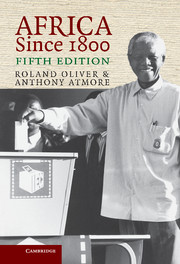Book contents
- Frontmatter
- Contents
- List of Maps
- ONE AFRICA NORTH OF THE EQUATOR
- TWO AFRICA SOUTH OF THE EQUATOR
- THREE THE OPENING UP OF AFRICA: (1) FROM THE NORTH-EAST
- FOUR THE OPENING UP OF AFRICA: (2) FROM THE MAGHRIB
- FIVE WEST AFRICA BEFORE THE COLONIAL PERIOD, 1800–1875
- SIX WESTERN CENTRAL AFRICA, 1800–1880
- SEVEN EASTERN CENTRAL AFRICA, 1800–1884
- EIGHT SOUTHERN AFRICA, 1800–1885
- NINE THE PARTITION OF AFRICA ON PAPER, 1879–1891
- TEN THE PARTITION OF AFRICA ON THE GROUND, 1891–1901
- ELEVEN COLONIAL RULE IN TROPICAL AFRICA: (1) POLITICAL AND ECONOMIC DEVELOPMENTS, 1885–1914
- TWELVE COLONIAL RULE IN TROPICAL AFRICA: (2) SOCIAL AND RELIGIOUS DEVELOPMENTS
- THIRTEEN THE INTER-WAR PERIOD, 1918–1938
- FOURTEEN NORTH AND NORTH-EAST AFRICA, 1900–1939
- FIFTEEN SOUTH AFRICA, 1902–1939
- SIXTEEN THE LAST YEARS OF COLONIAL RULE
- SEVENTEEN THE ROAD TO INDEPENDENCE: (1) NORTH AND NORTH-EAST AFRICA
- EIGHTEEN THE ROAD TO INDEPENDENCE: (2) AFRICA FROM THE SAHARA TO THE ZAMBEZI
- NINETEEN THE ROAD TO INDEPENDENCE: (3) CENTRAL AFRICA
- TWENTY THE LONG ROAD TO DEMOCRACY IN SOUTHERN AFRICA
- TWENTY ONE THE POLITICS OF INDEPENDENT AFRICA
- TWENTY TWO ECONOMICS AND SOCIETY IN INDEPENDENT AFRICA
- TWENTY THREE INTO THE THIRD MILLENNIUM
- EPILOGUE
- Suggestions for Further Reading
- Index
EPILOGUE
Published online by Cambridge University Press: 05 June 2012
- Frontmatter
- Contents
- List of Maps
- ONE AFRICA NORTH OF THE EQUATOR
- TWO AFRICA SOUTH OF THE EQUATOR
- THREE THE OPENING UP OF AFRICA: (1) FROM THE NORTH-EAST
- FOUR THE OPENING UP OF AFRICA: (2) FROM THE MAGHRIB
- FIVE WEST AFRICA BEFORE THE COLONIAL PERIOD, 1800–1875
- SIX WESTERN CENTRAL AFRICA, 1800–1880
- SEVEN EASTERN CENTRAL AFRICA, 1800–1884
- EIGHT SOUTHERN AFRICA, 1800–1885
- NINE THE PARTITION OF AFRICA ON PAPER, 1879–1891
- TEN THE PARTITION OF AFRICA ON THE GROUND, 1891–1901
- ELEVEN COLONIAL RULE IN TROPICAL AFRICA: (1) POLITICAL AND ECONOMIC DEVELOPMENTS, 1885–1914
- TWELVE COLONIAL RULE IN TROPICAL AFRICA: (2) SOCIAL AND RELIGIOUS DEVELOPMENTS
- THIRTEEN THE INTER-WAR PERIOD, 1918–1938
- FOURTEEN NORTH AND NORTH-EAST AFRICA, 1900–1939
- FIFTEEN SOUTH AFRICA, 1902–1939
- SIXTEEN THE LAST YEARS OF COLONIAL RULE
- SEVENTEEN THE ROAD TO INDEPENDENCE: (1) NORTH AND NORTH-EAST AFRICA
- EIGHTEEN THE ROAD TO INDEPENDENCE: (2) AFRICA FROM THE SAHARA TO THE ZAMBEZI
- NINETEEN THE ROAD TO INDEPENDENCE: (3) CENTRAL AFRICA
- TWENTY THE LONG ROAD TO DEMOCRACY IN SOUTHERN AFRICA
- TWENTY ONE THE POLITICS OF INDEPENDENT AFRICA
- TWENTY TWO ECONOMICS AND SOCIETY IN INDEPENDENT AFRICA
- TWENTY THREE INTO THE THIRD MILLENNIUM
- EPILOGUE
- Suggestions for Further Reading
- Index
Summary
Following our region-by-region survey of events in the 1990s, it seems appropriate to conclude with an overview of general factors concerning the African continent as a whole, as they appeared to stand at the end of that decade. First, despite the toll taken by the HIV/AIDS epidemic and other killer diseases, Africa's population continued to rise by 2.4 percent a year. Whereas in 1900 Africa comprised 4.5 percent of the world's total population, by 2000 this figure had risen to 10 percent of a world total of 6 billion. Largely for this reason, the people of Africa had become, statistically, the poorest in the world. Whereas the gross national per capita income of the United States stood at $34,100 and that of the UK at $24,430, Africa's richest country, Libya, thanks to its oil and its barely habitable deserts, hovered around $7,640. South Africa had $2,620 and Egypt $1,490. But, at the lowest end of the scale, almost nine people out of every ten in Africa's poorest countries were living on less than $2 a day; of these, two-thirds struggled to survive on less than $1 a day.
The urbanization of Africa during the 1990s had altered the whole pattern of government and society in most African countries. Although the poorer quarters of African towns might seem squalid to the passing traveller, life in them was regarded by their inhabitants as a considerable improvement over rural areas still lacking electricity, piped water, and drainage, and with most effective activity confined to the daylight hours.
- Type
- Chapter
- Information
- Africa since 1800 , pp. 369 - 382Publisher: Cambridge University PressPrint publication year: 2005



